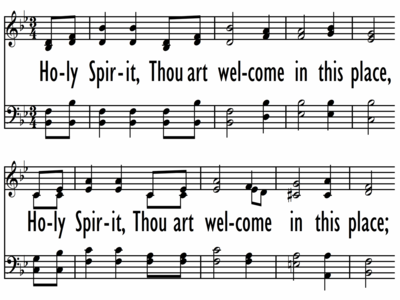Have you ever felt the presence of something greater than yourself in a place of worship? Perhaps a gentle warmth, a sudden peace, or a surge of inspiration? For many Christians, these feelings are often associated with the Holy Spirit, the divine presence of God working in the world. The phrase “Holy Spirit, thou art welcome in this place” is a powerful affirmation of this presence, echoing through hymns and prayers across denominations.

Image: www.sheetmusicdirect.com
But what exactly does this statement mean? How does the Holy Spirit manifest in a place, and why is it so important to welcome this divine presence? This article delves into the lyrics, exploring their theological and practical implications. We will examine the biblical foundation, the diverse interpretations of the Holy Spirit’s presence, and the ways in which this welcome becomes a transformative act of faith.
The Biblical Foundation: Understanding the Holy Spirit’s Presence
The concept of the Holy Spirit as a divine person, distinct yet inseparable from God the Father and God the Son, is central to Christian belief. The Bible, particularly the New Testament, reveals the Holy Spirit’s role as a powerful force in the lives of believers, empowering them to live out their faith and share the message of God’s love.
In the Book of Acts, the Holy Spirit descends upon the apostles, dramatically empowering them to preach the Gospel and perform miracles. This event highlights the Holy Spirit’s role in empowering people for ministry and service. Throughout the New Testament, the Holy Spirit is depicted as a guide, a comforter, and a source of spiritual gifts, enabling believers to live transformed lives.
The Importance of Welcoming the Holy Spirit
The phrase “Holy Spirit, thou art welcome in this place” transcends mere formalities. It signifies a conscious invitation, a heartfelt desire for the Holy Spirit’s active presence in a gathering. This welcome creates a space for the spirit to work, to inspire, to heal, and to empower.
Welcoming the Holy Spirit goes beyond simply allowing its presence. It entails a willingness to be transformed by its power. It invites individuals to open their hearts, minds, and actions to the guiding influence of the Holy Spirit. It is a commitment to allow God to work in and through us.
The Holy Spirit’s Many Manifestations: A Tapestry of Experiences
The Holy Spirit’s presence is not confined to a single, predictable experience. It manifests in various ways, often subtly and uniquely for each individual. While some might experience a powerful sense of joy, others might feel a deep peace or a sudden surge of inspiration. The Holy Spirit might work through an unexpected act of kindness, a profound sense of forgiveness, or a newfound clarity regarding a challenging situation.

Image: gardenweddingoutfitguestblue.blogspot.com
Examples of Manifestations:
- Spiritual Gifts: The Holy Spirit empowers believers with unique abilities like prophecy, healing, and teaching, enabling them to serve others with love and compassion.
- Personal Guidance: God’s presence through the Holy Spirit can provide guidance and direction in life choices, helping us navigate difficult decisions and find our purpose.
- Transformative Change: Through the Holy Spirit’s power, we can overcome sinful habits, embrace forgiveness, and experience spiritual renewal. This transformation allows us to become more like Christ and live more deeply in God’s love.
Creating a Welcoming Space: Building a Sanctuary for the Holy Spirit
The phrase “Holy Spirit, thou art welcome in this place” signifies more than just words. It calls for intentional actions that create an environment conducive to the Holy Spirit’s presence. This means cultivating a space of love, humility, and vulnerability.
In a church setting, this can involve several practices:
- Worship and Music: Singing hymns, praising God through uplifting music, and expressing heartfelt adoration can invite the presence of the Holy Spirit.
- Prayer and Meditation: Setting aside dedicated time for prayer, offering heartfelt requests, and seeking God’s guidance creates a channel for the Holy Spirit’s power to flow.
- Communion and Fellowship: Sharing the Lord’s Supper and building bonds of love and support among believers create a space for the Spirit to foster unity and community.
- Openness to the Unknown: Being willing to surrender our own plans and desires to the Holy Spirit’s guidance creates an environment for God to work in unexpected and wondrous ways.
The Individual Experience: Personalizing the Invitation
The Holy Spirit’s presence is not confined to church buildings or religious gatherings. It can be invited into our homes, our workplaces, and even our most solitary moments. The phrase “Holy Spirit, thou art welcome in this place” can become a personal mantra, a constant reminder to seek the Holy Spirit’s guidance in every aspect of life.
This invitation can be formalized through prayer or meditation, but it can also be expressed through our actions. Choosing to act with kindness, forgiving others, and seeking to live a life that reflects God’s love are all ways of welcoming the Holy Spirit’s influence into our daily lives.
Holy Spirit Thou Art Welcome In This Place Lyrics
Conclusion: The Ongoing Journey of Welcoming the Holy Spirit
“Holy Spirit, thou art welcome in this place” is not just a phrase; it’s a commitment, a lifestyle. It is a conscious decision to invite the Holy Spirit’s presence into our lives and our world. This invitation requires ongoing effort, a willingness to grow and change in harmony with God’s grace. This journey is rarely straightforward, but the rewards of surrendering to the Holy Spirit’s guidance are immense. It is through this welcoming embrace that we experience a deeper connection with God, experience transformation in our lives, and find greater purpose and meaning in our journey of faith.






